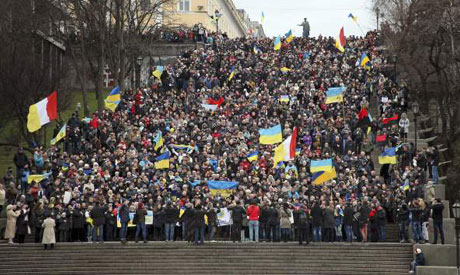
Ukrainians sing the national anthem waving national flags during an anti-war protest on the Potemkin Stairs considered a formal entrance into the city from the direction of the sea and the best known symbol of the Black Sea port of Odessa, Ukraine, Sunday March 9, 2014 (Photo: AP)
Ukrainian flags flutter over a gathering atop famed stairs that drop down to the Black Sea in the mainly Russian-speaking western port of Odessa, where separatist tensions have bolstered patriotism.
Since Russian forces took control last month of Crimea, on the opposite end of Ukraine's Black Sea coast, dozens of people have been meeting each day at the Potemkin Steps.
The seemingly endless flight of stairs were made famous in "Battleship Potemkin" -- a 1920s silent film directed about a warship whose crew mutinied against the Tsarist regime.
"We are defending the sovereignty of Ukraine and we want Ukraine to remain whole and indivisible," said Anastasiya Belous, one of the demonstrators.
"Many residents of Odessa have taken to the streets to ensure we are heard and visible," said Belous.
"We want to avoid the Crimea scenario, and we will not allow the division of our country," said the housewife.
Elena Gordeyeva, a Russian-born lawyer, said people in her community had always considered themselves Ukrainian.
"This suits us; we don't want any allegiance imposed on us by force," she said.
A city of one million people and a jewel in the old Russian Empire, Odessa has been shaken by the popular uprising that ousted pro-Kremlin president Viktor Yanukovych, and by Moscow's annexation of Crimea.
The situation in this strategic port, the entry point for one third of goods arriving in Ukraine, is being closely watched as it lies near Transdniestr, a breakaway majority Russian-speaking region of neighbouring Moldova.
As in other industrial strongholds of Ukraine, Donetsk, Kharkiv and Lugansk, rallies by pro-Moscow protesters calling for a referendum on joining Russia have raised tensions in the city.
On March 3, around 3,000 demonstrators assailed the government offices of Odessa, replacing the building's blue-and-yellow Ukrainian flag with the Russian tricolour.
"Odessa was founded by Russia. A return to Russia seems logical," said Oleksandr, who declined to give his surname.
The young man had pinned to his jacket an orange-and-black ribbon representing the order of Saint George, a symbol of Russia's victory over Nazi Germany during World War II.
But the pro-Russian demonstration has since been strongly countered by those defending Ukraine's unity, and the authorities have arrested the leader of the pro-Moscow movement.
Although Odessa is mainly Russian-speaking, more than 60 percent of the port's residents are Ukrainian. In contrast, Russians account for 60 percent of Crimea's population.
While rival demonstrators have clashed, at times bloodily, in the eastern cities of Donetsk and Kharkiv, those who support the new pro-European authorities in Kiev have held their own simultaneous rallies in Odessa, without any major incidents.
They turned out in force on March 9, when thousands massed on the Potemkin Steps to sing the Ukrainian national anthem, videos of which spread on the Internet.
"The tensions have now eased," said Artem Filipenko, political analyst at the National Institute of Strategic Research.
"Those that support the pro-European camp are more numerous, and this has been decisive," he said, adding, "The Odessa region leans towards staying in Ukraine."
Short link: